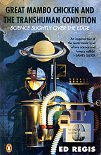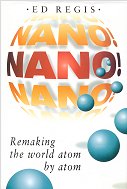In 1943 Erwin Schrodinger gave a series of lectures, published as
the book What is Life?
in 1944. This proved very influential on the development of genetic
biology: Crick, Watson, and other prominent biologists claim to
have been strongly influenced by it. 50 years on,
there was a follow-up, a series
of essays discussing its contribution. Now, 65 years on, and the scene
is almost unrecognisable. Regis brings us up-to-date, partly based
around various synthetic biology approaches to building life
from scratch.
There's lots of great historical detail, from the early days of
genetics, the discovery of DNA, the discovery of its structure, a
review of the 50-year follow-up conference, theories of the origin of
life, and some of what's happened recently, including the various 21st
century artificial cell projects such as PACE that are beginning to
take off.
And here is were the story diverges from Schrodinger's view. There
it was about genetics, about reproduction, about replication, being
the essence, the defining qualities of life. But Regis' account
focuses on metabolism as the key property. After all, "Anyone
who felt so inclined could forgo reproduction for their entire lives,
but no one could do without metabolism for a moment without extremely
serious consequences." There is even a suggestion that
metabolism came well before replication in the origin of life: the "Garbage-bag
World" model has bags of metabolisms reproducing (but not
replicating), and only later having their mechanisms hijacked by RNA
and DNA.
pp75-76.
In general, metabolism was the process
by which an organism maintained itself as a living entity. It did this
by bringing in raw materials from outside itself, reassorting their
chemical constituents, breaking down certain molecular structures and
building up others from their component molecules, thereby converting
the foodstuffs into substances required for the organism's continued
existence, as well as for its energy supplies. Your metabolism was
responsible for the fact that you could eat breakfast, wait awhile for
it to "digest," and then go out and jog five miles.
That metabolism could in fact be the
biological essence of life was plausible in the sense that the body's
motion and activity, its incessant molecular reshuffling, all of its
chemical getting and spending, depended upon the conversion of
nutrients into energy. When metabolism stopped, death ensued, complete
with rigor mortis.
Metabolism, furthermore, appeared to
perform on a daily basis, and automatically, the extraordinary feat of
transforming the nonliving into the living. By and large, people ate
dead things (such as cooked plants, fish, fowl, and meat), which their
metabolic systems then converted into integral and indispensable parts
of the living organism. Somewhere in the middle-somehow-chemistry
became biology.
Metabolism also explained how it was that
living things appeared to violate the second law of thermodynamics,
but didn't. As Schrodinger argued, their metabolic systems merely
withdrew orderly energy out of the environment and put disorder, or
entropy, back into it.
But the story of how an organism's
metabolism managed to do all these things at once was a tale of some
complexity.
So there's lots of good, thought-provoking stuff here.
I've included the quotation above for two reasons; firstly, because
it highlights to importance given to metabolism; but secondly, for the fact
that the choice of tense makes me grind my teeth when I read it. Apart
from the beginning and ending chapters, talking of present-day events,
all the intermediate "historical" chapters have everything
in the past tense, including things that are not historical, past,
over, but are still the case. When I read "metabolism
was the process by which an organism maintained itself", I
immediately think "so what is the process now?";
when I read "Your metabolism was
responsible for the fact..." I immediately think "so
what is responsible now?"; and so on, and so on. I am
continually having to think "oh, he doesn't mean it's no longer
true; it's just his idiosyncratic choice of tense." This is
published by Oxford University Press: what was the editor
thinking?
Nevertheless, worth reading, even if through gritted teeth.



